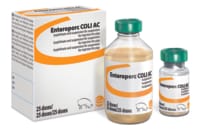Libourne, March 14 - Neonatal diarrhoea (ND) is one of the most common diseases on a pig farm today. In recent years, pig production has intensified, leading to an increase in the number of gilts and sows on farms, very often of hyperprolific breeds. This has contributed to an increase in prevalence of neonatal diarrhoea, resulting in significant economic losses and increased use of antimicrobials in the farrowing house. Estimated costs for herds affected by neonatal diarrhoea with mortality of 10 % caused by disease can be as high as 134 Euro per sow per year.
These threats prompted Ceva to develop a unique vaccine containing 7 antigens against the major pathogens involved in three infectious diseases, including Clostridium perfringens Type A (CPA) with alpha and beta 2 toxin. CPA has a special significance as it is now the most frequently detected pathogen in ND after E. coli.
However, the cause of ND is multifactorial, as a variety of pathogens are involved. Therefore, broad coverage by a vaccine is important for pig producers to save time and effort and contribute to animal welfare.
Ceva actively supports the detection of pathogens with diagnostic kits directly in the herd as well as with more in-depth analysis in the laboratory.
Ceva's support also includes recommendations for management measures that ensure the essential intake of colostrum in the first 24 hours after birth, as well as other interventions that secure an optimal suckling period.
FULL VERSION OF THE ARTICLE AVAILABLE ON CEVA'S SWITE SITE
>> Download PDF version

 Corporate Website
Corporate Website
 Africa
Africa
 Argentina
Argentina
 Asia
Asia
 Australia
Australia
 Belgium
Belgium
 Brazil
Brazil
 Bulgaria
Bulgaria
 Canada (EN)
Canada (EN)
 Chile
Chile
 China
China
 Colombia
Colombia
 Denmark
Denmark
 Egypt
Egypt
 France
France
 Germany
Germany
 Greece
Greece
 Hungary
Hungary
 Indonesia
Indonesia
 Italia
Italia
 India
India
 Japan
Japan
 Korea
Korea
 Malaysia
Malaysia
 Mexico
Mexico
 Middle East
Middle East
 Netherlands
Netherlands
 Peru
Peru
 Philippines
Philippines
 Poland
Poland
 Portugal
Portugal
 Romania
Romania
 Russia
Russia
 South Africa
South Africa
 Spain
Spain
 Sweden
Sweden
 Thailand
Thailand
 Tunisia
Tunisia
 Turkey
Turkey
 Ukraine
Ukraine
 United Kingdom
United Kingdom
 USA
USA
 Vietnam
Vietnam

